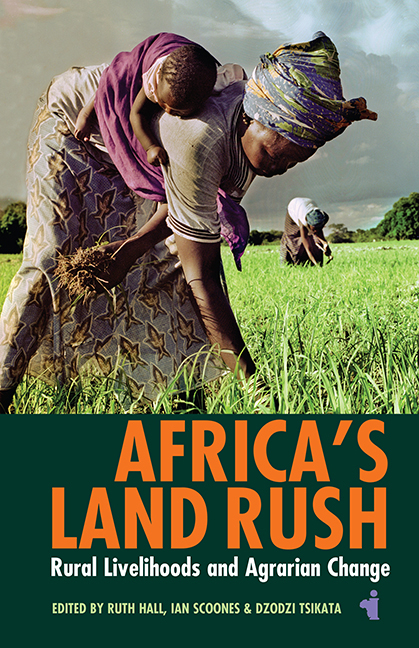Book contents
- Frontmatter
- Contents
- List of Maps, Tables & Figures
- Notes on Contributors
- Preface
- Acknowledgements
- List of Abbreviations
- 1 Introduction: The Contexts & Consequences of Africa’s Land Rush
- 2 State, Land & Agricultural Commercialisation in Kwara State, Nigeria
- 3 Recent Transnational Land Deals & the Local Agrarian Economy in Ghana
- 4 Large-Scale Land Acquisitions in Ethiopia: Implications for Agricultural Transformation & Livelihood Security
- 5 Land Deals & Pastoralist Livelihoods in Laikipia County, Kenya
- 6 Land Deals in the Tana Delta, Kenya
- 7 The State & Foreign Capital in Agricultural Commercialisation: The Case of Tanzania’s Kilombero Sugar Company
- 8 Trapped between the Farm Input Subsidy Programme & the Green Belt Initiative: Malawi’s Contemporary Agrarian Political Economy
- 9 Agrarian Struggles in Mozambique: Insights from Sugarcane Plantations
- 10 South African Commercial Farmers in the Congo
- References
- Index
6 - Land Deals in the Tana Delta, Kenya
Published online by Cambridge University Press: 21 May 2021
- Frontmatter
- Contents
- List of Maps, Tables & Figures
- Notes on Contributors
- Preface
- Acknowledgements
- List of Abbreviations
- 1 Introduction: The Contexts & Consequences of Africa’s Land Rush
- 2 State, Land & Agricultural Commercialisation in Kwara State, Nigeria
- 3 Recent Transnational Land Deals & the Local Agrarian Economy in Ghana
- 4 Large-Scale Land Acquisitions in Ethiopia: Implications for Agricultural Transformation & Livelihood Security
- 5 Land Deals & Pastoralist Livelihoods in Laikipia County, Kenya
- 6 Land Deals in the Tana Delta, Kenya
- 7 The State & Foreign Capital in Agricultural Commercialisation: The Case of Tanzania’s Kilombero Sugar Company
- 8 Trapped between the Farm Input Subsidy Programme & the Green Belt Initiative: Malawi’s Contemporary Agrarian Political Economy
- 9 Agrarian Struggles in Mozambique: Insights from Sugarcane Plantations
- 10 South African Commercial Farmers in the Congo
- References
- Index
Summary
Introduction
In recent years, large tracts of land within the Tana Delta and the adjacent districts have been set aside for industrial-scale farming, biofuel production and mining. This is threatening the livelihoods of both pastoralists and farmers. In addition, settlement schemes have taken up some of the most important dry season pastures within the Tana Delta and communities from outside the pastoral areas have been settled there to undertake crop farming. Individual/private ownership of land is increasingly replacing communal ownership. The consequences have included increasing levels of food insecurity in the area.
This chapter reviews the TARDA-Mumias partnership that is envisaged to alienate an additional 40,000ha of land within the delta, and is likely to displace more than 25,000 people in 30 villages from their traditional land. The chapter further provides some insights into other land acquisitions in the delta such as from Bedford Biofuels Inc., Tiomin Kenya Ltd, Galole Horticulture, Mat International and the Emirate of Qatar.
Ethnic conflict between the Pokomo farmers and the Orma and Wardei pastoralists that led to violence and destruction of lives and property in 2012 may have been the result of envisaged resource scarcity triggered by these proposed deals. While the local farmer and pastoral communities were united in their resistance to the deals, they were later set against each other politically, resulting in the loss of almost 200 lives during the conflict that ensued. The manipulation of local communities by government officials and national and local political elites is clearly discernible.
The data for this study were obtained between 2011 and 2013 through a mixture of approaches. Unfortunately, detailed information on land deals is lacking due to the unwillingness of both government and businesses with vested interests to fully disclose information. The research is therefore a picture pieced together from a variety of sources. These include a review of the existing literature, focus group discussions and interviews with key informants including government officials, community leaders, and elders who were able to discuss their perceptions of the projects taking place in the delta and the alienation of their land.
- Type
- Chapter
- Information
- Africa's Land RushRural Livelihoods and Agrarian Change, pp. 99 - 113Publisher: Boydell & BrewerPrint publication year: 2015



